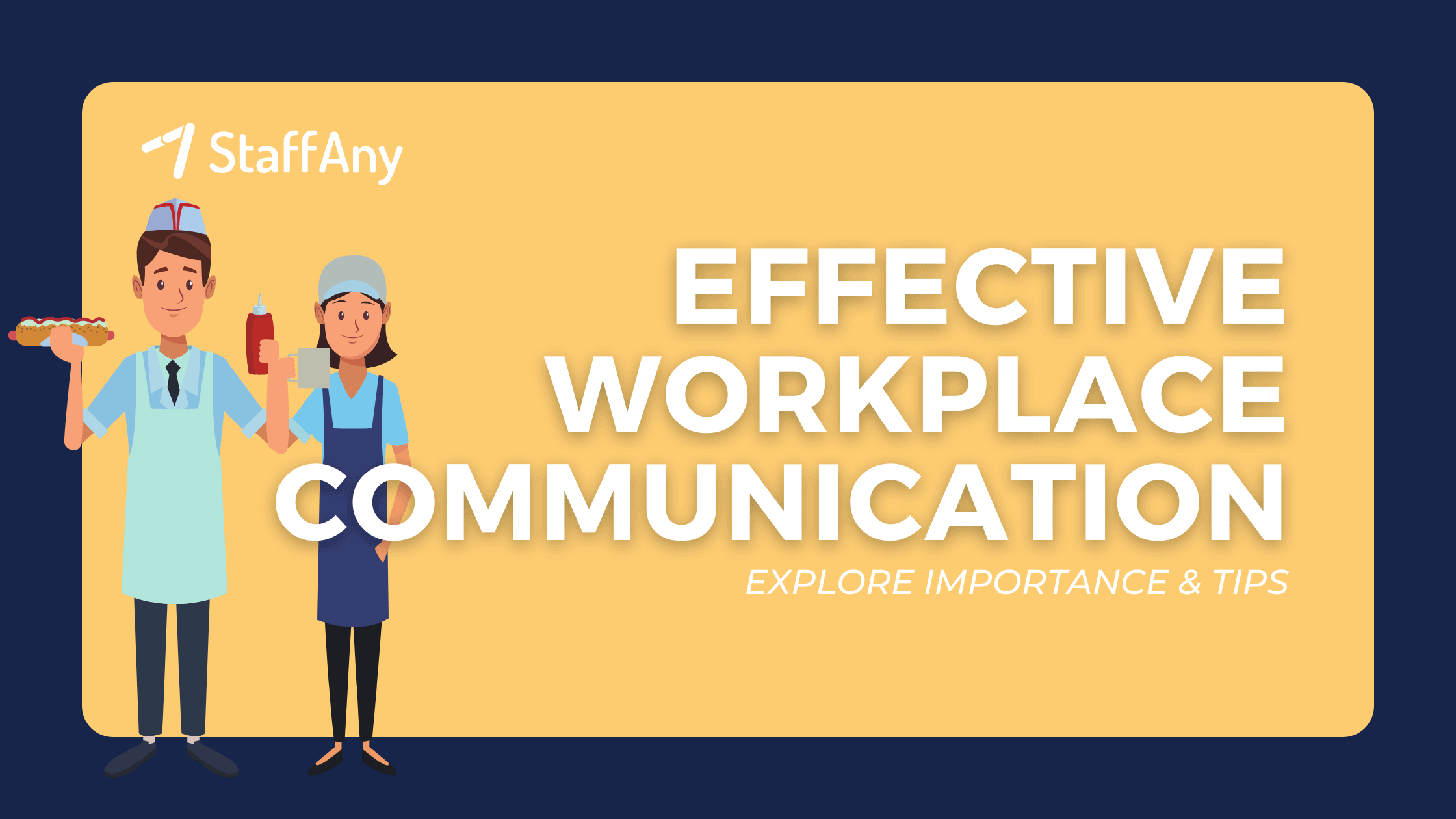

Effective workplace communication is a critical aspect of any business. Whether it’s communicating with employees, customers, or stakeholders, effective communication is essential to the success of a business.
In this article, we will explore the meaning of workplace communication and its importance in the F&B industry. We will also provide some tips to help you establish more effective workplace communication.


Workplace communication refers to the exchange of information and messages between employees, departments, and stakeholders within a business. It encompasses all forms of communication, including face-to-face conversations, emails, telephone calls, and video conferencing.
Effective workplace communication is essential for the success of a business, as it helps to foster collaboration, improve productivity, and increase morale among employees.
In addition, good communication should also involve active listening, where both parties are engaged in the communication process and are open to feedback.
Communicating effectively should be a two-way street, with employees feeling comfortable sharing their thoughts and ideas, and leaders being open to hearing and considering these opinions.
In today’s fast-paced business environment, technology has made it easier to communicate with employees and stakeholders, regardless of their location.
However, with the abundance of communication channels available, it’s important to establish clear communication protocols and guidelines to ensure that messages are delivered effectively and efficiently.
This will help to reduce the risk of miscommunication and increase the overall effectiveness of workplace communication and employee engagement.
Read more: Why Is Employee Engagement Important For Your Business?
The F&B industry is a dynamic and fast-paced environment that requires efficient and effective communication among employees, departments, and stakeholders. The importance of effective workplace communication in the F&B industry cannot be overstated, as it has a significant impact on the success of a business.
Effective workplace communication helps to reduce the risk of miscommunication in the F&B industry. With the high volume of orders and customer interactions, it’s essential that employees have clear and accurate information to carry out their tasks efficiently.
Poor communication can lead to delays, incorrect orders, and poor customer service, which can negatively impact the reputation of the business.
Good workplace communication promotes efficiency in the workplace by enabling employees to work collaboratively and effectively. Clear and consistent communication helps employees to understand their roles and responsibilities, which leads to fewer misunderstandings and a more productive work environment.
Read more: Understanding Manpower Planning and Its Importance in F&B
In the F&B industry, customer satisfaction is key to success. Effective workplace communication helps to ensure that customer service is consistent, efficient, and of high quality.
When employees have access to accurate information and are able to communicate effectively with one another, they are better equipped to handle customer inquiries and resolve any issues that may arise.
Communication skills are essential for fostering collaboration among employees and departments in the F&B industry. When employees are able to communicate effectively, they are better able to share ideas, work together on projects, and resolve any issues that may arise.
This leads to a more productive and efficient work environment, where employees feel valued and engaged.
Read more: 12 Employee Engagement Activities to Keep Your Staff Happy and Motivated
The 7 C’s of effective communication are a set of principles that can help improve communication skills. They are:
Be clear about your message. Use simple and easy-to-understand language. Avoid jargon and technical terms unless you are sure the listener understands them.
Convey your message in as few words as possible without sacrificing the meaning. Long-winded communication can lead to confusion and loss of interest.
Organize your thoughts logically. Your message should have a clear and logical flow so that the listener can follow your argument or story.
Read more: 11 Factors to Consider When Scheduling Staff
Ensure that your message is consistent across all channels and over time. Inconsistencies can lead to confusion and mistrust.
Consider the needs, interests, and perspective of your audience. Tailor your message to the audience’s level of understanding and cultural background. As you’re speaking with somebody, pay attention to your tone and body language and your partner’s.
Be respectful and polite in your communication. Use words and phrases that show your respect for the other person. Courtesy fosters a positive atmosphere and promotes understanding.
Establish yourself as a credible source of information. Provide evidence and examples to support your message. Credible communication builds trust and confidence.
Read more: 10 Critical Employee Scheduling Problems and How to Solve Them
In order to improve good communication skills in the F&B industry, here are some tips that businesses can follow:
Having clear and consistent communication protocols and guidelines is essential for effective workplace communication. This will help to ensure that messages are delivered effectively and efficiently, reducing the risk of miscommunication and increasing the overall effectiveness of workplace communication.
Active listening is an essential component of effective workplace communication. Encourage employees to actively listen to one another, engage in the communication process, and be open to feedback. This will help to create a more collaborative and productive work environment.
Creating an open-door policy, where employees feel comfortable sharing their thoughts and ideas, is essential for effective communication in the workplace. Encourage employees to speak up and share their opinions, and make sure that leaders are open to hearing and considering these opinions.
With the abundance of communication channels available, it’s important to utilise multiple channels to ensure that messages are delivered effectively and efficiently. This can include face-to-face conversations, emails, telephone calls, and video conferencing.
Read more: 10 Effective Employee Retention Programs to Keep Your Best Talents
Investing in training for employees on team communication skills can go a long way in improving communication in the workplace. This can include training on active listening, public speaking, and conflict resolution.
Providing regular feedback to employees is essential to improve communication in the workplace. This can be in the form of one-on-one meetings, performance reviews, or team meetings. Not only positive feedback but also negative feedback will help employees to understand their strengths and areas for improvement, leading to a more productive and efficient work environment.
Encouraging collaboration among employees and departments is essential for effective workplace communication in the F&B industry. By working together, employees can share ideas, resolve any issues that may arise, and improve overall productivity.
Creating a culture of respect and trust is essential for effective workplace communication. Encourage employees to treat one another with respect, and foster an environment where employees feel valued and supported. This will help to create a positive work environment, where employees are more likely to engage in productive communication.
Read more: The Complete Guide to Employee Performance Evaluation
Establish clear communication expectations within the team and across the organization. Clearly define how and when communication should occur, including response times, preferred methods of communication, and expectations for professional and respectful interactions.
As a leader or manager, exemplify effective communication by actively practicing the aforementioned tips. Be transparent, approachable, and accessible to your team. Demonstrate active listening, clarity in your communication, and openness to feedback. Your behavior sets the tone for the entire team collaboration and reinforces the importance of effective communication.
Timely communication with suppliers is essential for inventory management in the F&B industry. Clear communication helps negotiate prices, manage deliveries, and adapt to changes in the supply chain, contributing to operational efficiency and cost-effectiveness for the restaurant.
In the modern F&B landscape, technology plays a significant role in communication. Online reservation systems, mobile ordering platforms, and communication tools streamline processes, enhance customer experiences, and facilitate internal coordination, contributing to overall operational efficiency.
Effective workplace communication is foundational for success in the F&B industry, impacting various aspects ranging from order accuracy and team dynamics to customer service and supply chain management. Establishing clear communication channels and leveraging technology are essential strategies for navigating the dynamic and competitive landscape of the F&B sector.
Read more: 10 Effective Strategies for Managing Diversity in the Workplace
Effective workplace communication is critical for success in any industry, particularly in the F&B industry. In this business, workplace communication can impact customer satisfaction, collaboration among employees, and overall efficiency.
By implementing these tips, you can foster a workplace culture that values and promotes effective communication. This will lead to stronger relationships, increased collaboration, improved problem-solving, and enhanced overall team building and organizational performance.
For F&B businesses looking to improve workplace communication, StaffAny can help. StaffAny is a human resource management platform that provides a range of tools and resources to help businesses streamline communication and improve collaboration among employees.
With features such as onsite time-clock, scheduling, and performance evaluations, StaffAny can help your business establish effective workplace communication and achieve success. Visit StaffAny to learn more about how you can improve workplace communication in your business!
John Cheong is a highly experienced marketing professional with over two decades of expertise in crafting innovative marketing strategies and leading successful marketing teams.
StaffAny and F&B Connect hosted a roundtable session called "F&B Learning Meet-up" for the second…
Managing payroll starts with tracking your staff’s work hours (including any overtime, shift replacements, and…
Keeping track of your employees' work hours and managing payroll can be a real headache.…
It's really important for payroll process to be done right for part-time workers, especially in…
It is no secret that F&B and retail sectors require special working hours and a…
As a business owner in Malaysia, you may spend a significant amount of time each…
